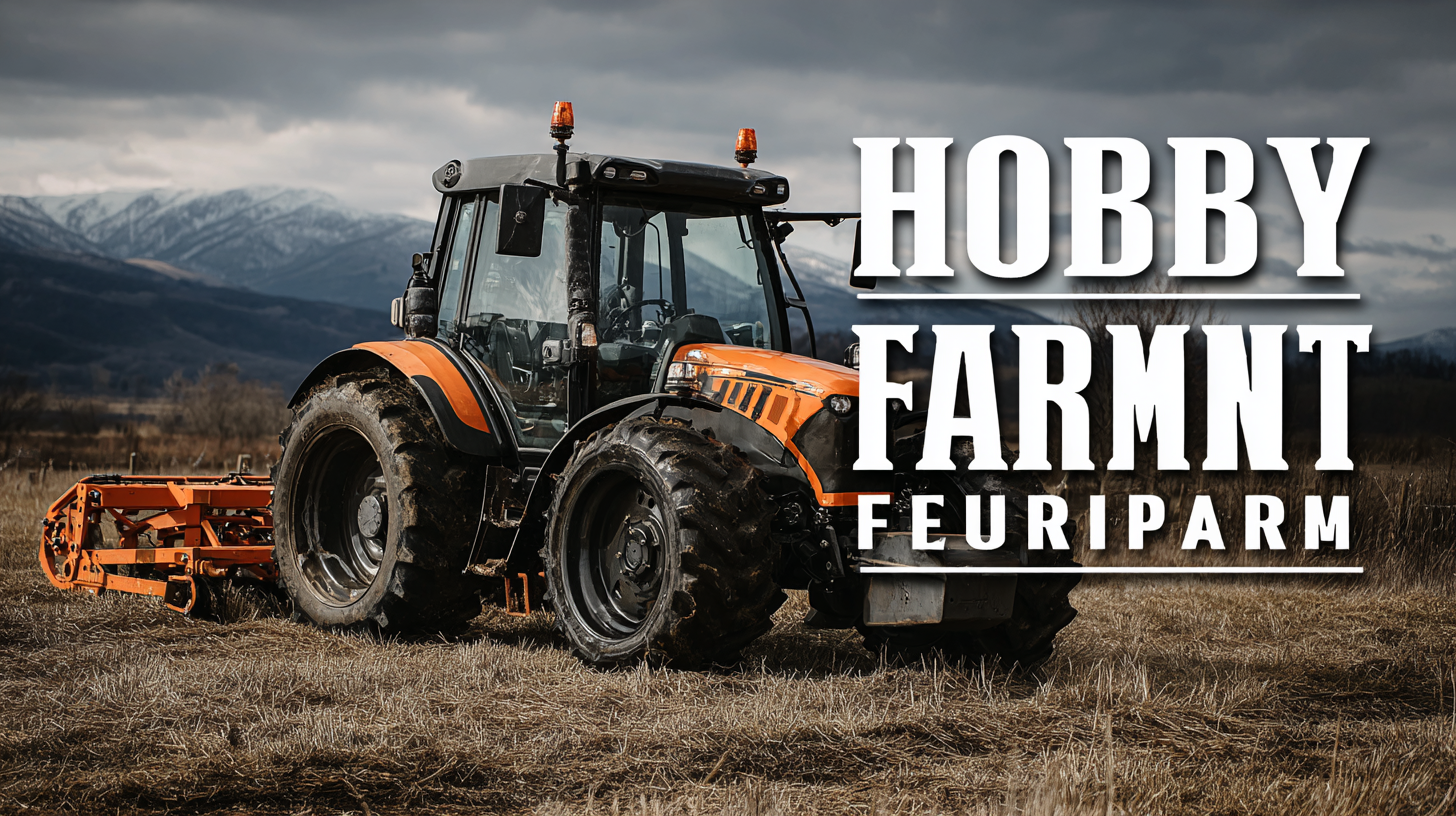As the trend towards sustainable living continues to gain momentum, many individuals are turning to hobby farming as a viable means to connect with nature and promote self-sufficiency. According to a report by the American Farm Bureau Federation, over 30% of U.S. households now engage in some form of home agriculture, emphasizing the growing interest in cultivating personal crops and raising livestock. However, achieving success in hobby farming requires not only passion but also the right hobby farm equipment to enhance productivity and sustainability. In this guide, we will explore various factors to consider when selecting equipment that suits your farming goals, budget constraints, and environmental impact. By making informed choices on the right tools and machinery, you can optimize your farming experience while contributing positively to the ecosystem.

As hobby farming gains traction among individuals seeking sustainable living solutions, understanding the market trends for hobby farm equipment is pivotal. According to a report by Market Research Future, the global market for agricultural equipment is anticipated to grow at a CAGR of 6.1% from 2020 to 2025. This growth reflects an increased demand for eco-friendly farming practices and tools that are compatible with sustainable living approaches.
In particular, innovative tools such as solar-powered irrigation systems and lightweight, energy-efficient tractors are becoming more desirable among hobby farmers. A recent survey conducted by the American Society of Agricultural and Biological Engineers indicated that 47% of hobby farmers are prioritizing renewable energy solutions in their equipment choices. Additionally, the rise of smart farming technologies, such as precision agriculture tools and IoT-connected devices, is driving the market forward, allowing hobby farmers to optimize their productivity while minimizing environmental impact. This shift towards sustainability in equipment selection demonstrates a broader trend towards responsible, mindful farming practices by 2025.

When selecting hobby farm equipment for sustainable living, it's essential to focus on key factors that align with eco-friendly practices.
Firstly, consider the material of the tools. Opt for equipment made from recycled or sustainably sourced materials to minimize environmental impact.
Additionally, the durability of the equipment plays a significant role; investing in high-quality tools can reduce waste and lower the need for frequent replacements.
Another critical aspect is the energy efficiency of the equipment. Choose tools that are designed to operate with minimal energy consumption, such as manual or low-energy options.
This not only contributes to sustainability but also helps reduce operational costs.
Furthermore, assess the multifunctionality of tools; equipment that can serve multiple purposes can significantly save space and resources on your farm.
By taking these factors into account, you can effectively select the best hobby farm equipment that promotes a sustainable lifestyle while enhancing productivity.

When selecting hobby farm equipment, energy efficiency should be a prime consideration for sustainable living. With rising awareness among farmers regarding sustainable practices—reported at 90% by a McKinsey survey—the shift to more efficient technologies is critical. Lean farming emphasizes maximizing outputs while minimizing wasted resources, allowing farmers to grow more with less. The integration of smart sensors and IoT technologies in agriculture illustrates this shift as these tools can monitor essential crop growth factors and optimize usage, thus conserving energy and resources.
Moreover, precision agriculture, utilizing technologies like GPS and automation, provides substantial benefits in efficiency. Auto-steering and automated monitoring systems not only enhance productivity but also contribute to energy conservation by reducing unnecessary fuel consumption and labor costs. As the agricultural sector navigates these advancements, it's essential for hobby farmers to invest in energy-efficient equipment that aligns with a sustainable future, reducing their environmental footprint while increasing their farm's productivity and viability.
As hobby farming gains popularity among those seeking sustainable living, the integration of innovative technologies is revolutionizing the industry. Precision agriculture, characterized by the use of data analytics and IoT, plays a crucial role in enhancing productivity while minimizing environmental impact. By employing sensors to monitor soil health and crop conditions, hobby farmers can make informed decisions that promote efficient resource use, ultimately supporting the principles of sustainable food production.
Moreover, the adoption of green technologies is not just a trend; it reflects a broader movement towards more sustainable agricultural practices worldwide. For instance, recent studies highlight the significant role of contract farming in enhancing green technological efficiency, providing small farmers access to modern techniques that previously seemed unattainable. As various communities engage in sustainable practices, the collective push toward integrating smart equipment and eco-friendly methods will undoubtedly pave the way for a new chapter in hobby farming, fostering a resilient and sustainable agricultural landscape.
When considering the best hobby farm equipment for sustainable living, conducting a cost-benefit analysis is essential. Quality equipment often requires a higher initial investment, but it can lead to significant long-term savings and increased efficiency. For instance, investing in durable tools that require less frequent replacement can ultimately save you money over time. Additionally, equipment designed for energy efficiency can reduce ongoing operational costs, making your farming endeavors more sustainable in the long run.
Tips for selecting the right equipment include researching product reviews and performance ratings to gauge reliability and durability. It's also a good idea to consider multi-functional tools, which can decrease overall expenditure and storage needs. Lastly, don’t hesitate to reach out to local farmers or hobbyists in your community for recommendations—firsthand experience is invaluable when seeking quality equipment that aligns with your sustainable farming goals.
| Equipment Type | Initial Cost ($) | Lifespan (Years) | Maintenance Cost/Year ($) | Energy Source | Sustainability Rating (1-5) |
|---|---|---|---|---|---|
| Tractor | 20,000 | 15 | 1,500 | Diesel | 3 |
| Riding Mower | 3,000 | 10 | 300 | Gasoline | 2 |
| Solar Panels | 10,000 | 25 | 100 | Solar | 5 |
| Compost Bin | 150 | Indefinite | 50 | N/A | 5 |
| Greenhouse | 5,000 | 20 | 200 | Electricity | 4 |